#Hannie Schaft
Explore tagged Tumblr posts
Photo
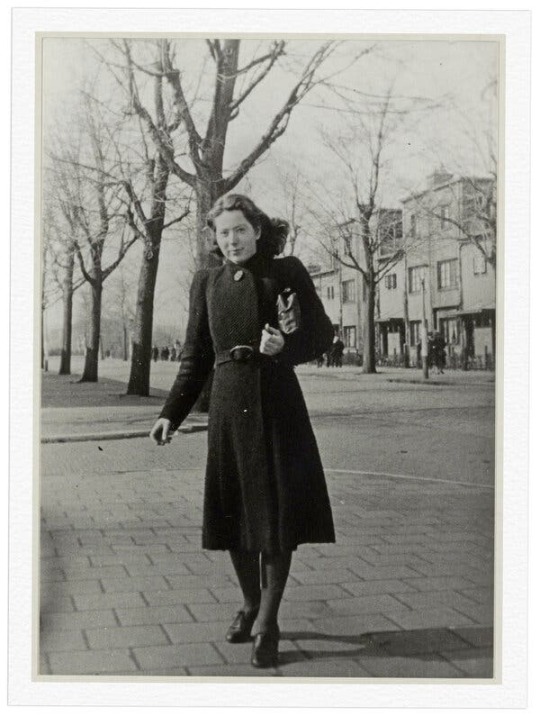
(via Overlooked No More: Hannie Schaft, Resistance Fighter During World War II - The New York Times)
She killed Nazis in the Netherlands and was known as “the girl with the red hair” on their most-wanted list. Then she was executed.
50 notes
·
View notes
Text

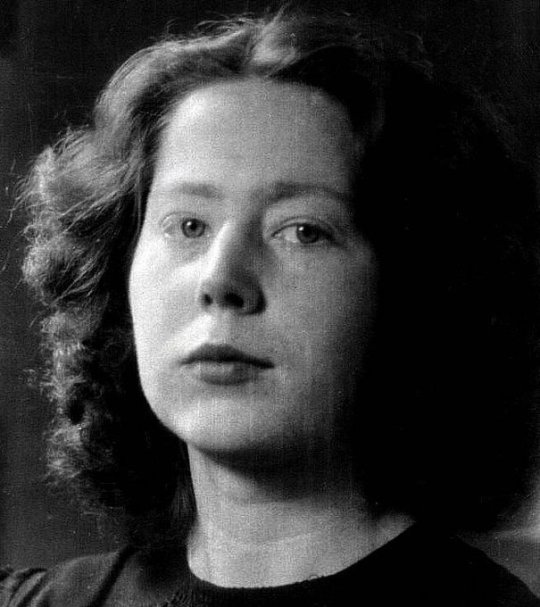
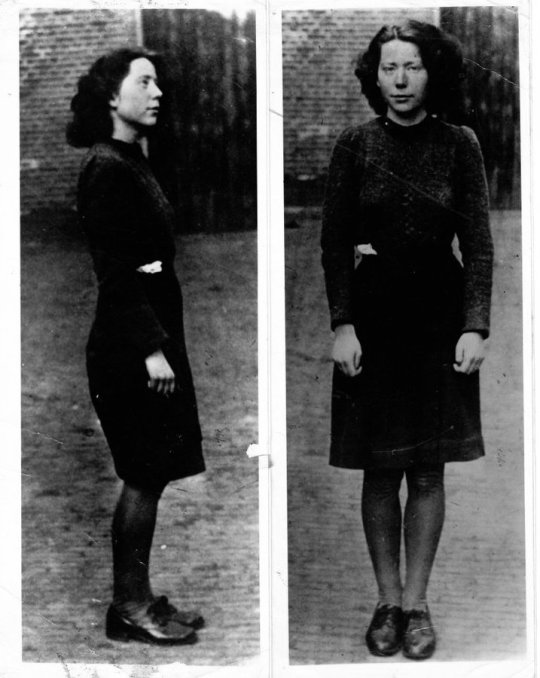
13 notes
·
View notes
Photo
spread the word people
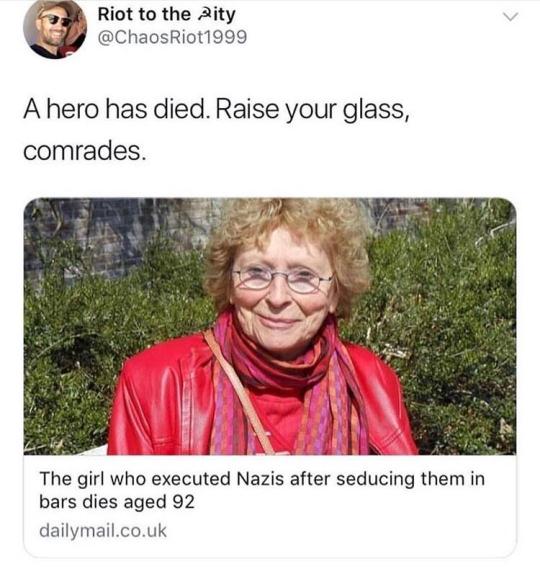
#freddie oversteegen#truus oversteegen#johanna schaft#hannie schaft#history#history lesson#spread the word#women in wwii#women in wartime#women in world war two#rust zacht zuster#rest in peace sister
152K notes
·
View notes
Text
My Favourite Book Characters Part Two - The Simpletons
These characters aren’t magically inclined. They don’t have some otherworldly element to their existence that makes them incredible. There isn’t anything powering them that is supernatural or paranormal or anything that isn’t human. They are simple human beings with average lives and they are amazing people. That’s what this category is about – simple people being genuinely good humans for the…
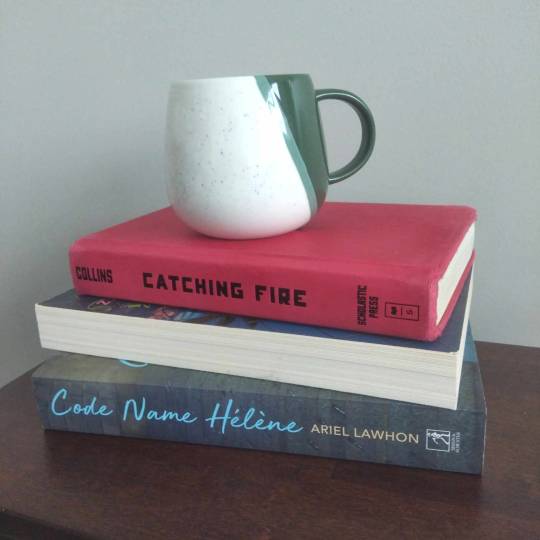
View On WordPress
#annafromuni discussions#book characters#book icons#character review#codename helene#discussion post#favourite characters#finnick odair#hannie schaft#Historical Fiction#nancy wake#real life heroes#the girl with the red hair#the hunger games#war fiction#ya dystopian
0 notes
Text
Anyways I’m reading The Girl with the Red Hair and it’s very good but if Hannie Schaft wasn’t an actual historical figure I would have thought that having a character have bright orange hair during the German occupation of the Netherlands was a little too on the nose.
#but hey! its a coincidence!! which honestly the fact that it is a true story does make it better#unfortunately i also know how it ends#hannie schaft
1 note
·
View note
Text
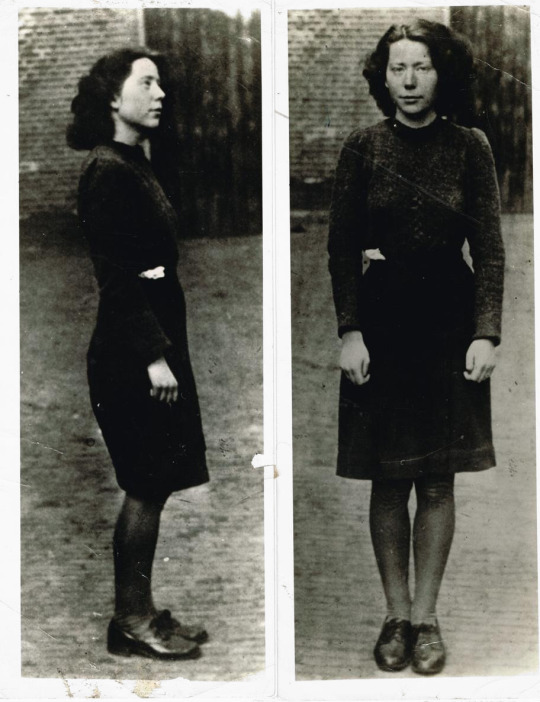
Hannie Schaft at Amsterdam House of Detention at Amstelveenseweg, just before her execution, April 1945
#Hannie Schaft at Amsterdam House of Detention at Amstelveenseweg#just before her execution#April 1945
1 note
·
View note
Text
This is my list of (IMHO) genuinely heroic people. I keep this list so that when I'm feeling uninspired I can pick a name at random, look them up, and be inspired. My memory kinda sucks so I've usually forgotten about them in the interim so it's like hearing some inspiring story for the first time. Please feel free to use this list for that purpose or for whatever purpose helps you. This is a private thing I've been absent-mindedly curating for years, so it's a little discombobulated; maybe I should put it in alphabetical order, for example. Since it works for what I use it for, though, I've never had the need for that, although there may be some duplicates specifically because of that.
If you have any additions, I'd love to hear them.
If you know of a reason somebody should not be on here, I'd love to hear that too. There are some controversial choices here, some people I've hemmed and hawed about, but in the end they're still on the list.
In no particular order:
Einar Musæus Høigård
Charles Littlejohn
Rachel Corrie
Aaron Bushnell
Sophie Scholl
Irena Sendler
Eugeniusz Łazowski
Mary Schweitzer. I know who she is but I'm including her anyway. Takes guts to do what she did
Temar Boggs
Juan Pujol García
Warrant Officer Hugh Thompson
Robert Smalls
Temar Boggs
Henrietta Swan Leavitt
Aitzaz Hassan Bangash Shaheed. Might already be on here; I need to alphabetize this list
Sal Khan. Yeah, I'm including him
Irena Sendler
Neerja Bhanot
Iqbal Masih
Tank man
Stephen Ruth. The guy with the cameras. He's no tank man, but why not, he's on the list
Malala Yousafzai
Narendra Dabholkar
Dietrich Bonhoeffer
Sophie Scholl
Charles Hazlitt Upham
Wang Weilin
John Rabe (? ... Kind of questionable for obvious reasons. He saved a couple hundred thousand Chinese people though. I don't know. He was what he was.)
Baron Jean Michel P.M.G. de Selys Longchamps, DFC
Aitzaz Hasan Bangash
Daniel Hale
Hannie Schaft
Reality Winner … I guess
Aki Ra
Norman Borlaug
Neil Armstrong
Stanislav Petrov
Vasili Alexandrovich Arkhipov
William Kamkwamba
Donald A Henderson
Freddie Oversteegen
Daryl Davis and his collection of robes
Jacinto Convit
Sir Nicholas Winton
August Landmesser
Jonas Salk
Carl Lutz
Giorgio Perlasca
Derrick Nelson, principal of Westfield High School in New Jersey
Giles Corey
Chiune Sugihara
Sophie Scholl
Ronald McNair? Why not
Khader Adnan
Mordechai Vanunu
Corollary:
I'm not sure how to phrase "the opposite of this list," so I'm just going to call it the opposite of this list. Genuinely villainous people? Too easy, and honestly not what I'm going for. Anyway, I'm going to leave out the obvious like Hitler, Trump and Gaddafi because they're, well, obvious. Actually I'm not really sure what the goal of this list is so I'm just kind of winging it. People not to emulate?
Marvin Heemeyer
#heroic people#heroes#people that make me think good thoughts#inspiring#inspirational#positivity#upbeat#feel good#This makes me a little happy again
46 notes
·
View notes
Text

Freddie Oversteegen, Truus Menger-Oversteegen, and Hannie Schaft were among the few women in the Dutch resistance during World War II. Raised in a leftist, anti-fascist household, Freddie and Truus were just 14 and 16 when they were recruited by the resistance. Hannie, a university student, later joined their ranks. Together, they carried out daring missions to sabotage Nazi infrastructure, such as destroying bridges and railways to hinder German troop movements. They also smuggled Jewish children to safe houses, ensuring their survival.
One of their most dangerous tactics involved seducing Nazi officers and Dutch collaborators. The young women would flirt with their targets in bars or on the street, gaining their trust before luring them into secluded areas where they were assassinated. This method, while risky, proved highly effective in eliminating key Nazi figures and traitors. Despite the constant threat of capture, they remained fearless, knowing the importance of their mission.
Hannie Schaft became particularly notorious to the Nazis, earning the nickname "the girl with the red hair." Her activities made her a high-priority target, and she was eventually captured in 1945. Despite being tortured, she refused to betray her comrades. Tragically, she was executed just weeks before the war ended. Freddie and Truus survived, later dedicating their lives to advocating for peace and sharing their story.
Their bravery disrupted Nazi operations in the Netherlands and inspired future generations. Though their heroism remained largely unrecognized for years, they were later honored for their contributions to the resistance, proving that even the youngest fighters can change history.
8 notes
·
View notes
Text
i do not play when it comes to hannie schaft and freddie oversteegen and truus menger oversteegen. btw.
2 notes
·
View notes
Link
Hans is al ruim 5 jaar actief als bestuurssecretaris van de Nationale Hannie Schaft Stichting en is op 4 februari de nieuwe voorzitter geworden. Hij neemt het stokje over van Jeroen Pliester die in augustus vorig jaar na een ziekbed is overleden. Sindsdien trad Hans reeds als interim-voorzitter op. Jeroen was sinds september 2012 voorzitter van de stichting die in 1996 is opgericht. Zijn voorzitterschap liet zich kenmerken door een grote toewijding aan het gedachtegoed van Hannie Schaft en de zusters Oversteegen. Zijn vele gesprekken met Truus en Freddie vormden een blijvende bron van inspiratie. Deze inspiratie zorgt er onder andere voor dat Hans met volle overtuiging zijn tijd geeft aan de stichting. Hij zal als voorzitter, in de geest van zijn voorganger, het gedachtegoed van de stichting blijven uitdragen. Nationale Hannie Schaft Stichting De Nationale Hannie Schaft Stichting wil mensen – vooral ook jongeren – inspireren om het verschil te maken wanneer het erop aankomt en op te komen voor vrijheid en gelijkwaardigheid in de geest van WO II verzetsstrijder Hannie Schaft. Vanuit een diepgaande overtuiging over onrecht, gelijkwaardigheid en het belang van een democratische rechtsstaat, kwam zij in actie voor onze vrijheid. De Stichting organiseert jaarlijks de Nationale Hannie Schaft Herdenking en de Hannie Schaftlezing op de laatste zondag van november. De stichting is politiek neutraal en onafhankelijk.
0 notes
Text
FACES IN THE CROWD, HET MASKER VAN DE MENS

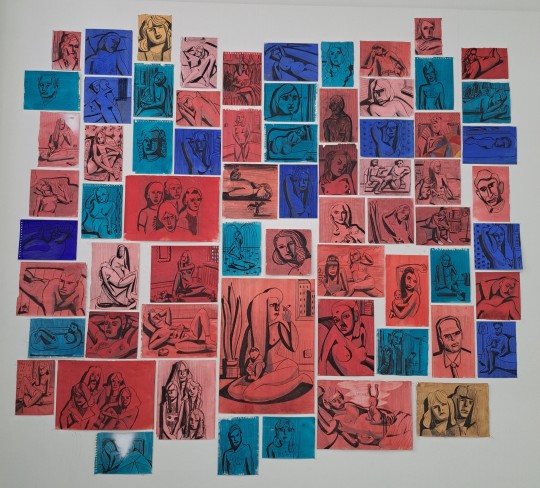
In Afslag BLV is het geen aapjes kijken. Het is meer dan dat. De aapjes kijken naar mij. Ik kijk niet op iets toe wat ik beschouw als een curiosum, een merkwaardige ervaring, maar het is wel een bijzondere belevenis. Bij binnenkomst voel ik niet meteen betrokkenheid, pas minuten later heb ik het vermogen mij in te leven in het gegeven. Ik ken dan wel geen enkele van de door Robert Geveke geportretteerde voorbijgangers, maar dat is niet zo verwonderlijk. O ja, ik zie Hannie Schaft, want de zwartwit foto van de verzetsvrouw is weer erg actueel. Maar voor de rest zijn de koppen als de gezichten op een datingsite, waardoor ik ongeïnteresseerd naar links veeg of erlangs scroll. Aapjes kijken. Passanten in de massa, zonder uitdrukking. Voor een moment aandacht, voor een tel niet ongezien.
Het is een kleurige variatie aan gezichten. In zichzelf verzonken blikken. Ze kijken langs of dwars door mij heen. Vooral dat laatste maakt mij ongedurig. Rusteloos loop ik door de ruimte, gejaagd doordat ik steeds blikken in mijn rug voel. De expositie maakt me paranoia. Ik voel me bekeken, terwijl ik hier ben om te kijken. De kunstenaar bestudeert in zijn werk het gedrag en de mimiek van de figuren, ieder afzonderlijk, elk op een eigen manier. Van de onpersoonlijke objecten in het grote geheel van een groep mensen maakt hij persoonlijke figuren. Het draait niet om herkenning, het is geen individu. Het gaat om de vorm en het kleurgebruik. De realiteit is tot een abstract beeld gemaakt.
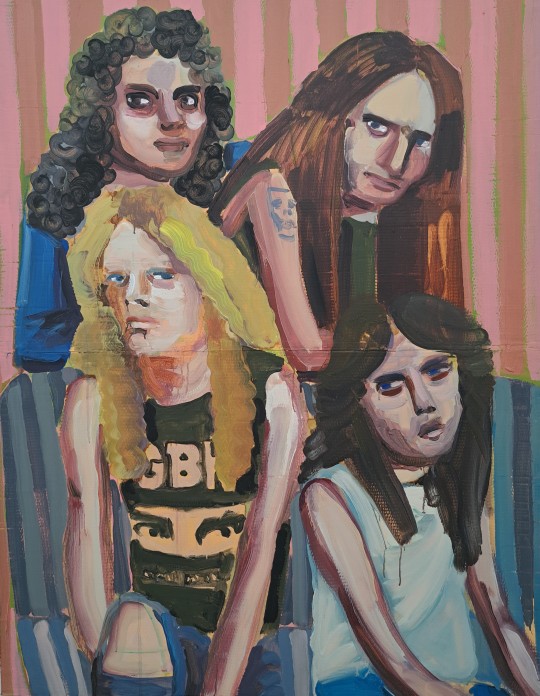
Het groepsportret van wat een muziekband lijkt bijvoorbeeld, vier harige jongens die apathisch en onverschillig in de lens kijken, is een karakteristiek. In hun koele oogopslag zetten zij zich letterlijk van de wereld af. Sterren die weten wat ze willen en doen wat ze kunnen. En zo kijken meerdere enigszins verwezen ogen vanaf het portret de ruimte in. De maskers gaan niet af voor de schilder, hoewel hij wel tot de persoon probeert door te dringen. Het diepste wezen durft hij bloot te leggen, maar kan geen vinger achter het zijn krijgen. In de portretten van Geveke is de typering van weinig belang. Het is de houding en de oogopslag die herinneren aan een gevoel. Deze stralen een emotie uit, meest doordringend met een blik als van een arend.
Omdat het kenmerk van de zonderling minder voorop staat, daarom zijn figuren wel als figuranten afgebeeld. Hebben geen blik waaruit een wezen kan worden gepuurd. Enkel de stand van het lichaam geeft informatie, het gelaat heeft wel enkel neus en mond – de ogen ontbreken. De ogen, die meestal de vensters tot de ziel zijn. Deze figuren zijn gebeeldhouwd uit de werkelijkheid. Deze gestalten zijn, hoewel gefantaseerd realistische figuren, abstract onpersoonlijke beelden. Ze geven geen krimp en zijn zo hard en onbewogen als waren ze van steen. Achter deze façade echter schuilt een gevoelige geest, een harde bolster met een blanke pit. Door het materiaalgebruik, de zachte pastel vlakt de hardheid van het wezen af, ogen de portretten bedachtzaam en zijn ze zich van de vergankelijkheid van het leven bewust. Ondanks de haast en het rumoer van vandaag de dag trekken zij zich terug in zichzelf en vat Geveke juist dit moment, geeft ze pas op de plaats. Eigenlijk een contemplatieve benadering. In zijn overpeinzing achter de tekentafel bespiegelt hij het zijn.
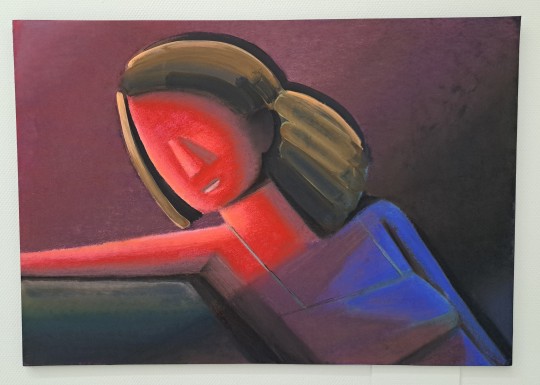
Wanneer Robert Geveke gaat zitten en kijken, observeren en beschouwen, komt hij tot geschetste portretten. Dan documenteert hij de mens in elke vorm en iedere hoedanigheid. Ik stel me hem zo voor dan op een stoel zittend op het terras achter een kop dampende koffie. Het schetsboek in de hand, in dit geval met gekleurde bladen, en het potlood of de pen in de aanslag om meteen toe te slaan wanneer zich een onbenullig moment voordoet om te vereeuwigen en zodoende belangrijk te maken. Het schetsmatige karakter van een snelle gewaarwording staat een gedetailleerde verwerking echter niet in de weg. De tekeningen zijn kronkels of droedels, schetsen in de marge van het leven. Reële werkelijkheden krijgen een arrangement in de werkelijkheid van zijn eigen verhaal, de vertelling van Robert Geveke. Hij geeft woorden aan zijn idee bij het zichtbare. De letters zijn de lijnen, de woorden de vlakken in de tekening. Wie de taal kan lezen doorziet de beeltenis, die meer is dan een illustratie.
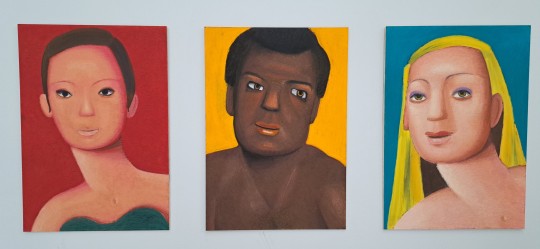
Geïnstalleerd in een wolk van gekleurde vellen aan een wand van Afslag BLV geeft het een getinte realiteit weer. Beschouw ik de veelvormigheid van de massa. Zie ik ook hier weer niet het individu als eenling, maar bekijk de levendigheid van de lichamelijke expressie. Mensen die zich verschuilen achter de onpersoonlijke mimiek, omdat ze niet herkent willen worden maar zich toch op plekken begeven waarop ze kunnen worden geïdentificeerd. De expositie “Maquillage” is als de opgemaakte mens op TikTok, Facebook of X. Het figuur wil figurant zijn, maar toch met kop en schouders boven het maaiveld uitsteken. Onopvallend opvallend. Kwetsbaar in wezen, lichtgeraakt van binnen, maar hard in zijn, ongevoelig van buiten. Aapjes kijken, dat is wat het is.
Maquillage. Expositie tekeningen en schilderijen van Robert Geveke bij Afslag BLV, Minckelersstraat 11 in Heerenveen. Te zien van 8 december 2024 tot 16 februari 2025.
0 notes
Text

hannie schaft was friend to the oversteegen sisters and known as "the girl with the red hair" to the nazis, who put her on their most wanted list due to how good of an assassin she was, though she was also a brilliant courier. she stopped briefly when her parents were sent to a concentration camp, but upon their release dyed her hair black and carried on until she was eventually caught at a military checkpoint and executed three weeks before the official end of the war. hitler had personally ordered her capture. the first bullet only grazed her head, at which she supposedly said "i shoot better," her final words. she was 25.
“young adult dystopian novels are so unrealistic lmao like they always have some random teenage girl rising up to inspire the world to make change.”
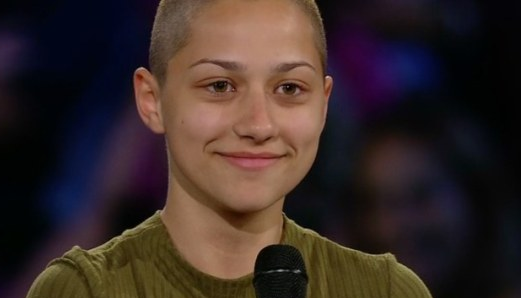
a hero emerges
506K notes
·
View notes
Text
i think the worst part about being first speaker in this debate is im going to come out and be like “hi guys human agency is why we are the makers of history bc like hannie schaft and miep gies could have sat and done nothing but they didn’t and now we know who they are. also like only 4% of the dutch population actually resisted in big ways. a lot of people conformed to the status quo!” and then second speaker affirmative is probably going to rebuttal that by talking about why im lumping the other 96% together and how that’s binary (it is - technically collaborators also made history- but i really have to simplify my point) and how they were made by their circumstances anyhow (especially in mieps case, it was an offer she accepted) bc their acts were defined by the nazi occupation of the netherlands and im going to have to resist the urge to bite someone because biting is not acceptable at university level.
#that last part is a joke#but my point is quite clear i think#they resisted in risky ways and now we know who they are#not deminishing smaller acts of resistance btw bc they helped in not nazifying the place so my take is just as binary as de jong#they were resisting too. actively went against the german plan to control the dutch#but yea human agency to do something about the shot situation of the jewish population actively helped them make history#it’s different from my essay. but i think its good
1 note
·
View note
Text
There is a new nazi problem in our neighborhood. Time to infiltrate in the spirit of Hannie Schaft.
1 note
·
View note
Text
Novidade | "A garota do cabelo vermelho", de Buzzy Jackson
“A garota do cabelo vermelho”, de Buzzy Jackson foi lançado recentemente pela @editoraarqueiro. Sinopse: Quando os alemães invadem os Países Baixos em 1940, Hannie Schaft é uma jovem estudante de Direito cheia de planos para o futuro. À medida que a ameaça nazista avança, colocando em risco a vida de suas melhores amigas, ambas judias, ela sente que não pode ficar parada e se junta à…

View On WordPress
0 notes
Note
OMG SHUT UP CAN WE PLS TALK ABOUT ZACH (maclaren lol) BEING LIKE “this book is super interesting i didn’t know women in wwii were so bad ass” LIKE THE WAY MY HEART LEPT OUT IF MY CHEST I STARTED CRYING BRO
as you know i’m a history student and whenever i get the chance i specialize in women in wwii bc he is right they are so badass!! i believe (unconfirmed) he was talking ab hanny schaft and her sister and their little gang bc they actually SLAYED but there are so so many stories of women just being cool and tough as shit and it is NOT TALKED ABOUT ENOUGH!!! i’ve done several papers and assignments on these girlies and i just- ugh i would love that book and i’m so glad he did
OMG YES LETS ALL TAKE A MOMENT TO APPRECIATE THIS BECAUSE AHHHH I soo highly appreciate and have such major heart eyes about you and your entire major and what all you study, so i 10000% feel you about that and YES LETS AB IT ALL YOU WANT BC I LOVEEE THIS
1 note
·
View note